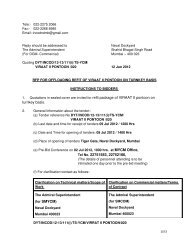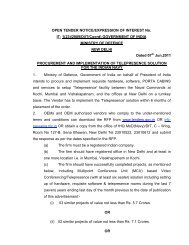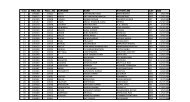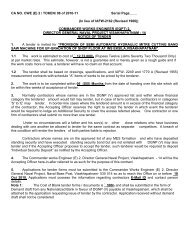deployment of the PLA Navy ships in the - Information Resource ...
deployment of the PLA Navy ships in the - Information Resource ...
deployment of the PLA Navy ships in the - Information Resource ...
You also want an ePaper? Increase the reach of your titles
YUMPU automatically turns print PDFs into web optimized ePapers that Google loves.
NAVAL DESPATCH<br />
FFFFFFFFFFFFFFFFFFF<br />
<strong>the</strong>y want and also at competitive prices. This is<br />
because <strong>the</strong>y follow open standards, be it design,<br />
build, operate, ma<strong>in</strong>ta<strong>in</strong> and disposal.<br />
Fur<strong>the</strong>r, <strong>the</strong> crew has to take one set <strong>of</strong> courses,<br />
as def<strong>in</strong>ed by International Maritime Organisation, <strong>in</strong><br />
STCW 95. They follow <strong>the</strong> common syllabus, but still<br />
are able to operate and ma<strong>in</strong>ta<strong>in</strong> variety <strong>of</strong> ship’s and<br />
equipment. Though one may argue that naval<br />
platforms role viz a viz commercial <strong>ships</strong> are different,<br />
it is op<strong>in</strong>ion <strong>of</strong> <strong>the</strong> author that as far as <strong>the</strong> equipment<br />
and systems support<strong>in</strong>g <strong>the</strong> <strong>ships</strong> ability to float and<br />
move are concerned, <strong>the</strong>re is a lot <strong>of</strong> commonality. It<br />
may <strong>the</strong>refore be advisable for <strong>the</strong> IOR navies, some<br />
<strong>of</strong> <strong>the</strong>m are not very advanced, to follow commercial<br />
ship practices.<br />
International Maritime Organisation. The<br />
International Maritime Organisation (IMO) formed <strong>in</strong><br />
Geneva 1948 had its Convention entered <strong>in</strong>to force<br />
<strong>in</strong> 1958. The purposes <strong>of</strong> IMO as summarize by Article<br />
1(a) <strong>of</strong> <strong>the</strong> Convention are among o<strong>the</strong>rs ”to provide<br />
mach<strong>in</strong>ery for cooperation among governments <strong>in</strong><br />
<strong>the</strong> field <strong>of</strong> regulation and practices relat<strong>in</strong>g to<br />
technical matters <strong>of</strong> all k<strong>in</strong>ds affect<strong>in</strong>g shipp<strong>in</strong>g<br />
engaged <strong>in</strong> <strong>in</strong>ternational trade.<br />
IMO’s first task was to adopt a new version <strong>of</strong> <strong>the</strong><br />
International Convention for <strong>the</strong> Safety <strong>of</strong> Life at Sea<br />
(SOLAS), <strong>the</strong> most important <strong>of</strong> all treaties deal<strong>in</strong>g with<br />
maritime safety. Although safety was and rema<strong>in</strong>s<br />
IMO’s most important responsibility, newer problems<br />
have began to emerge ma<strong>in</strong>ly related to pollution and<br />
security.<br />
North Atlantic Treaty Organisation (NATO)<br />
The North Atlantic Treaty was signed on 4 April<br />
1949 by <strong>the</strong> Foreign M<strong>in</strong>isters <strong>of</strong> twelve nations. The<br />
twelve be<strong>in</strong>g Belgium, Canada, Denmark, France,<br />
Iceland, Italy, Luxembourg, <strong>the</strong> Ne<strong>the</strong>rlands, Norway,<br />
Portugal, United K<strong>in</strong>gdom and United States <strong>of</strong><br />
America. Greece and Turkey acceded to <strong>the</strong> Treaty <strong>in</strong><br />
1952, <strong>the</strong> Federal Republic <strong>of</strong> Germany <strong>in</strong> 1955, Spa<strong>in</strong><br />
<strong>in</strong> 1982 and <strong>the</strong> Czech Republic, Hungary and Poland<br />
became full members <strong>in</strong> 1999.<br />
NATO functions through large number <strong>of</strong> both<br />
high level and work<strong>in</strong>g level committees and groups.<br />
One <strong>of</strong> <strong>the</strong>m high level committee at <strong>the</strong> strategic level<br />
is dedicated to Standardization, called Military Agency<br />
for Standardization (MAS) addresses operational and<br />
procedural standardization, and NATO Term<strong>in</strong>ology<br />
through four Service Boards (<strong>Navy</strong>, Army, Air and<br />
Jo<strong>in</strong>t) and <strong>the</strong>ir related work<strong>in</strong>g groups. The MAS<br />
monitors <strong>the</strong> production and updat<strong>in</strong>g <strong>of</strong> operational<br />
Standardization Agreements (STANAGs) and Allied<br />
Publications (APs). expand is <strong>the</strong> UK authority for<br />
ratification <strong>of</strong> Operational STANAGs and co-ord<strong>in</strong>ates<br />
<strong>the</strong> national staff<strong>in</strong>g <strong>of</strong> <strong>the</strong>ses STANAGs, as well as<br />
oversee<strong>in</strong>g <strong>the</strong> activities <strong>of</strong> UK delegations to <strong>the</strong> many<br />
work<strong>in</strong>g parties support<strong>in</strong>g <strong>the</strong> MAS boards.<br />
WAY AHEAD AND RECOMMENDATIONS<br />
• Create Interoperability Framework.<br />
A set <strong>of</strong> norms, standards, and references which<br />
describe an accomplished or desired<br />
agreement <strong>of</strong> <strong>in</strong>terested parties on ways <strong>of</strong><br />
<strong>in</strong>terconnectivity should be created.<br />
Interoperability framework should be a liv<strong>in</strong>g<br />
document which must keep up to date with <strong>the</strong><br />
changes <strong>in</strong> technology, norms and bus<strong>in</strong>ess.<br />
The ma<strong>in</strong> requirements, which each standard<br />
for equipment and systems and <strong>the</strong> <strong>in</strong>terfaces<br />
between various naval assets with<strong>in</strong> <strong>the</strong><br />
<strong>in</strong>dividual navy and across <strong>the</strong> navies, must<br />
meet, should be well def<strong>in</strong>ed.<br />
• Secure Interoperability.<br />
Interoperability must be secured at <strong>the</strong> technical<br />
(norms and standards for equipment and<br />
systems), semantic (mean<strong>in</strong>g <strong>of</strong> data) and<br />
process levels (def<strong>in</strong><strong>in</strong>g processes and<br />
actualiz<strong>in</strong>g cooperation between various naval<br />
units).<br />
• Interoperability should not be treated as<br />
sell<strong>in</strong>g equipment or systems; ra<strong>the</strong>r it should be<br />
about build<strong>in</strong>g trust through relation<strong>ships</strong>.<br />
• Common Technical Tra<strong>in</strong><strong>in</strong>g. The only<br />
way to reach effective <strong>in</strong>teroperability <strong>in</strong> spite <strong>of</strong><br />
<strong>the</strong> effects <strong>of</strong> <strong>the</strong> “cultural” differences is by liv<strong>in</strong>g<br />
and tra<strong>in</strong><strong>in</strong>g toge<strong>the</strong>r, and by ga<strong>in</strong><strong>in</strong>g<br />
understand<strong>in</strong>g and knowledge - as well as<br />
acceptance - <strong>of</strong> <strong>the</strong> o<strong>the</strong>r’s ways <strong>of</strong> see<strong>in</strong>g and<br />
do<strong>in</strong>g th<strong>in</strong>gs. There is no substitute for wellplanned<br />
and rigorous tra<strong>in</strong><strong>in</strong>g programs for all<br />
military forces, especially mult<strong>in</strong>ational ones.<br />
The mission effectiveness <strong>of</strong> <strong>the</strong> comb<strong>in</strong>ed<br />
operations depends on it.<br />
FFFFFFFFF<br />
FFFFFFFFF SEPTEMBER 2009<br />
13



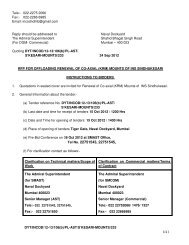
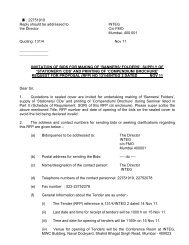
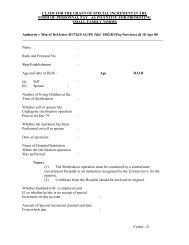
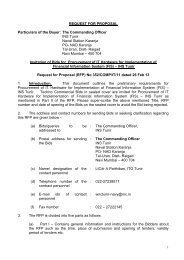
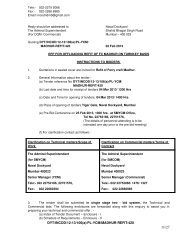
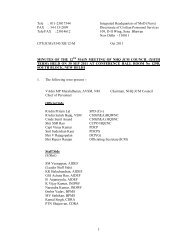

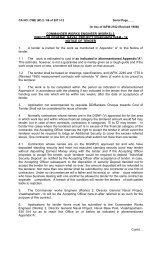
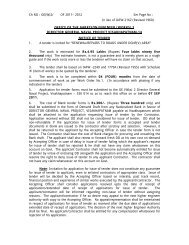
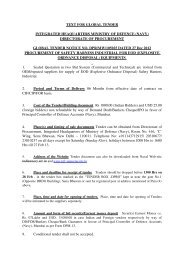
![DGNP[V] - Irfc-nausena.nic.in](https://img.yumpu.com/23509938/1/158x260/dgnpv-irfc-nausenanicin.jpg?quality=85)
